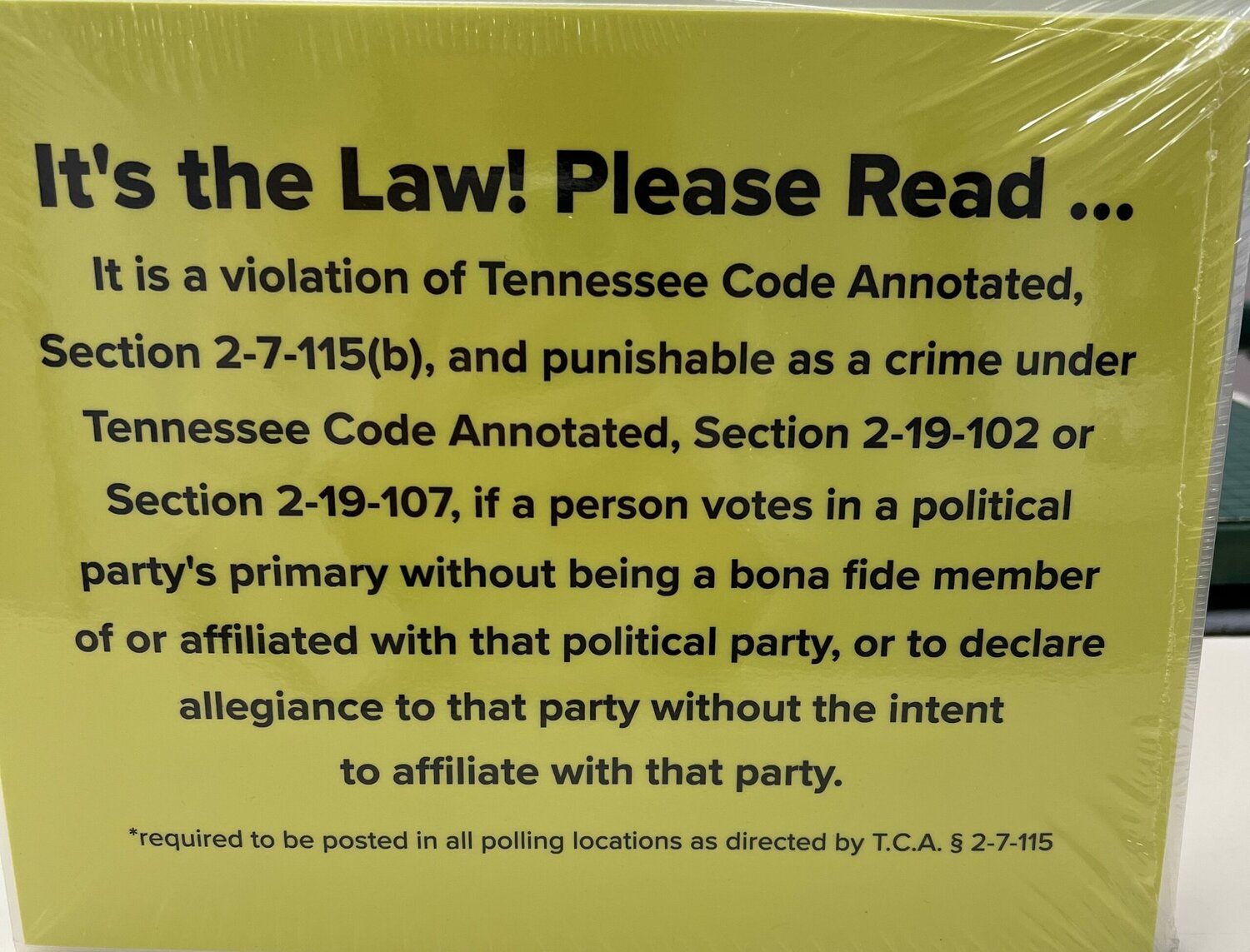Democrats question primary voting law
Early voting for the Presidential preference primary as well as Madison County primary elections starts on Wednesday.
It runs from Feb. 14 until Feb. 27 from 9 a.m. until 4 p.m. Monday through Friday and 9 a.m. until noon on Saturday.
There is no early voting on Feb. 19 for President’s Day.
Even though the Madison County Election Commission offices moved in 2022, early voting still happens at the 4H auditorium at 311 North Parkway across the street from the Jackson-Madison County Schools Central Office.
The Election Commission met on Monday to discuss one item regarding the upcoming election.
A few months ago when the state election commission had a statewide convention of county election administrators, and everyone was handed a packet that included laminated copies of TCA Code 2-7-115(b).
That’s the code that became a point of contention during the 2022 county primary elections when voters claimed in social media and local media to be crossing over to vote in the Republican primary.
Violation of the code is a Class C misdemeanor that typically results in no jail time with some monetary fee.
Then-local Republican Party chairman Larry Lowrance posted a video on the local party’s Facebook page saying due to the law that crossover voting was illegal and prosecutable.
Copies of the law were then posted at the early voting site, causing some non-Republicans to accuse them and the election commission of voter suppression.
The laminated copies of the law given out by the state at the convention in the fall are meant to be posted prominently at early voting and at all voting precincts on election day, which is March 5.
The point of discussion at Monday’s meeting was the notion of possibly putting the law at the top of the ballot application one requests when voting in a primary.
Four of the five commissioners were present, including two Republicans – Chairman Mike Bledsoe and Tim Wilson – and both Democrat members – Wendy Trice-Martin and Lovette Brooks. The vote was split down party lines with the Republicans voting to put the law on the application and the Democrats voting against it.
Trice-Martin and Brooks had reservations about it.
“I don’t live in this district, but if I as a Democrat wanted to vote for Sherry Franks for school board if I knew her and supported her and thought she’d have the best interests of our children in mind for the job, why don’t I have the right to vote for her?” Trice-Martin asked.
“You can in the general election,” Bledsoe answered. “But crossing over is against the law, according to the law we have here in front of us.”
Regarding enforcement of the law, Trice-Martin asked how could someone be found to be crossing party lines and how they could be prosecuted.
“They can check your voting record and see if you’re crossing over party lines,” Bledsoe said.
“And who is ‘they?’” Trice-Martin asked, to which the answer was explained anyone who suspected another person of crossing over to vote and wanted to file a civil complaint, which Attorney General Jody Pickens could prosecute if a voting record for a bona fide member of one party (based on past primary election votes) suddenly were to vote in the other party’s primary.
“No one can see who you’ve voted for in a general or primary election, but there is a public record of a person voting in a primary and in which party’s primary,” said Election Administrator Lori Lott.
Brooks and Trice-Martin both questioned if posting the law was a form of voter suppression and trying to scare someone into not voting.
Wilson compared the situation to something like a “No trespassing” sign at the edge of a person’s property in the woods.
“I’d appreciate someone letting me know if I were about to break the law,” Wilson said.
“We’re not telling anyone they can’t vote,” Lott said. “But the law says that members of parties have to vote in their own party’s primary.
“That’s what the law says, and the law also says this has to be posted.”
The Democrats along with other members of the party present at the meeting including local Democrat Party Chairman Larry Greer and local NAACP President Harrell Carter expressed frustration and accused the Republican majority state legislature of trying to suppress voting.
The law was originally passed in 1972 with a couple of amendments in 1997, 2000 and 2023. Until 2009, the Democratic Party held the majority in both houses of the state legislature. The amendment last year was to ensure the law being visibly posted at all sites of election including early voting as well as all precincts on election day.
Brandon Shields, brandon@jacksonpost.news






